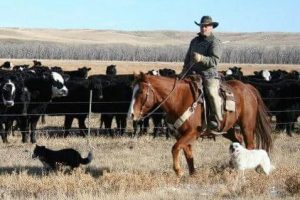Cases
R-CALF USA v. USDA
CASE: R-CALF USA v. United States Department of Agriculture, et al.
STATUS: Closed
NCLA ROLE: Counsel
COURTS HEARD IN: SCOTUS, 10th Cir., D. Wyo.
ORIGINAL COURT: U.S. District Court for the District of Wyoming
DECIDING COURT: U.S. Supreme Court
OPENED: October 3, 2019
AGENCIES: Department of Agriculture
FOCUS AREAS:
CASE SUMMARY
Did we achieve our litigation objective? Yes. The Department of Agriculture’s (USDA) withdrew its guidance as a result of the litigation and the livestock producers represented by NCLA were not required to submit to the costly and unnecessary new guidance that contradicted the rule in place.
Court Outcome: The district court ruled against NCLA but USDA backed away from its guidance when NCLA appealed to the U.S. Court of Appeals for the Tenth Circuit.
Larger Impact: The USDA is just one of dozens of agencies that routinely exceed their legislatively mandated authority by enforcing nonbinding guidance documents as if they were the law. Stacking victories against such overreach is the only way to stop this arrogation of power.
Summary: Ranchers and livestock owners took the U.S. Department of Agriculture (USDA), its subagency, the Animal and Plant Health Inspection Service (APHIS), and the heads of those agencies to the Supreme Court over the government’s effort to phase out the use of metal eartags, brands, backtags, and similar low-cost means of identifying livestock. NCLA argued that APHIS failed to comply with statutory requirements in the Federal Advisory Committee Act (FACA) when it established two advisory committees and that the U.S. Court of Appeals for Tenth Circuit let APHIS off the hook based on an unduly confined interpretation of “established” that would gut FACA. U.S. courts of appeals had issued sharply conflicting decisions on the issues presented in this case—warranting Supreme Court review to resolve the split in authority.
NCLA argued that APHIS formed the “Cattle Traceability Working Group” (CTWG) and “Producer Traceability Council” (PTC) as federal advisory committees in 2017 and 2019, respectively, to assist in the development of the unlawful mandate requiring radio frequency identification (RFID) eartags to trace livestock. APHIS devoted significant resources to convince livestock industry representatives of the need for an advisory committee and to spell out the proposed committee’s agenda. APHIS “established” CTWG (and its successor PTC) under any common understanding of that word, and within the meaning of FACA. The district court and the Tenth Circuit held otherwise, based not on any disagreement about the factual record but on their unusually narrow constructions of the word “established.” That interpretation directly conflicts with an U.S. Court of Appeals for the Eleventh Circuit decision and is in considerable tension with the Supreme Court’s decision in Public Citizen v. U.S. Department of Justice.
A key contested issue in a large percentage of FACA cases is whether a group is a FACA “advisory committee” that was “established” by the President or a federal agency—and thus subject to FACA constraints. The Tenth and Eleventh Circuits have disagreed regarding when the President or an agency should be deemed to have “established” a FACA advisory committee. And the Supreme Court’s decision in Public Citizen strongly suggested that “established,” as used in FACA, should be interpreted as taking its ordinary meaning—or if anything a broader sense, not a narrower one.
The factual evidence was overwhelming that APHIS played the major role in creating the advisory committees. The decisions below, however, provided APHIS and all other federal agencies with a roadmap for further evading FACA. The Act imposes important procedural and transparency requirements on federal advisory committees to ensure they operate in an open, fair, and transparent manner. But according to the Tenth Circuit decision, agencies like APHIS that find the FACA requirements burdensome now have an easy means of evading them by just setting up the committee and then skipping its initial meeting. This case warranted a Supreme Court review to determine whether Congress intended that FACA be construed so narrowly as to render it toothless, but the Court denied NCLA’s petition for a writ of certiorari.
RELEVANT MATERIALS
NCLA FILINGS
U.S. Supreme Court Order Denying Petition for Writ of Certiorari
March 6, 2023 | Read More
Reply Brief for Petitioners
February 14, 2023 | Read More
Brief for the Respondents in Opposition
January 27, 2023 | Read More
Petition for a Writ of Certiorari
September 19, 2022 | Read More
Opinion Judgment Filed - U.S. Court of Appeals for the Tenth Circuit
May 20, 2022 | Read More
PRESS RELEASES
NCLA Petitions Supreme Court to Review Tenth Circuit’s Misinterpretation of “Established” in FACA
September 19, 2022 | Read More
NCLA Asks 10th Cir. to Declare USDA’s Livestock RFID Federal Advisory Committees Violated FACA
August 26, 2021 | Read More
As USDA Advisory Committees Violate FACA, Court Should Prohibit Use of Future Recommendations
April 23, 2021
NCLA Praises WY Legislature, Gov. for New Law Protecting Ranchers’ Animal ID Technology Choices
April 14, 2021
NCLA’s Suit Forces USDA to Abandon Efforts to Use Guidance to Mandate RFID Eartags for Livestock
March 23, 2021
IN THE MEDIA
NCLA Responds to WY Court Ruling on FACA Claim against USDA
Value Walk
February 7, 2023
Lawsuit Against USDA Over Electronic Livestock Tags Continues
NPR
February 7, 2023
Federal Policy Could Undermine Wyo Cattle ID Legislation
WyoFile
February 7, 2023
Federal court in Wyoming asked to block RFID technology
Food Safety News
February 7, 2023
Wyoming, R-CALF work against required RFID tags in court
Sublette Examiner
February 7, 2023
CASE HIGHLIGHTS
Media Mention
February 7, 2023
NCLA Responds to WY Court Ruling on FACA Claim against USDA
Source: Value Walk
Media Mention
February 7, 2023
A Return To Rule By Guidance Document?
Source: Cato Institute
Press Release
September 19, 2022
NCLA Petitions Supreme Court to Review Tenth Circuit’s Misinterpretation of “Established” in FACA

